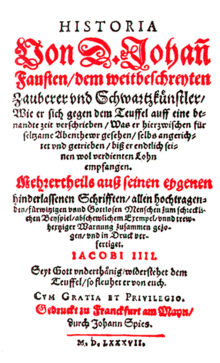
Christopher Marlowe, also known as Kit Marlowe, was an English playwright, poet, and translator of the Elizabethan era. Marlowe is among the most famous of the Elizabethan playwrights. Based upon the "many imitations" of his play Tamburlaine, modern scholars consider him to have been the foremost dramatist in London in the years just before his mysterious early death. Some scholars also believe that he greatly influenced William Shakespeare, who was baptised in the same year as Marlowe and later succeeded him as the preeminent Elizabethan playwright. Marlowe was the first to achieve critical reputation for his use of blank verse, which became the standard for the era. His plays are distinguished by their overreaching protagonists. Themes found within Marlowe's literary works have been noted as humanistic with realistic emotions, which some scholars find difficult to reconcile with Marlowe's "anti-intellectualism" and his catering to the prurient tastes of his Elizabethan audiences for generous displays of extreme physical violence, cruelty, and bloodshed.

Faust is the protagonist of a classic German legend based on the historical Johann Georg Faust. The erudite Faust is highly successful yet dissatisfied with his life, which leads him to make a pact with the Devil at a crossroads, exchanging his soul for unlimited knowledge and worldly pleasures. The Faust legend has been the basis for many literary, artistic, cinematic, and musical works that have reinterpreted it through the ages. "Faust" and the adjective "Faustian" imply sacrificing spiritual values for power, knowledge, or material gain.
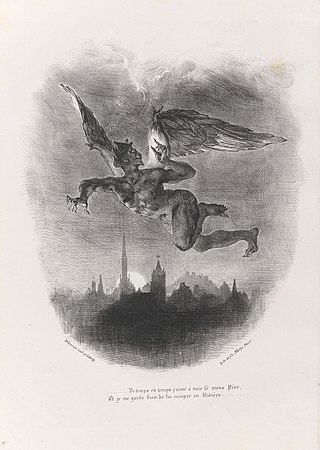
Mephistopheles, also known as Mephisto, is a demon featured in German folklore. He originally appeared in literature as the demon in the Faust legend and has since become a stock character appearing in other works of arts and popular culture.
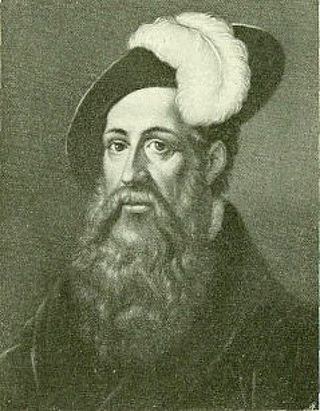
Johann Fust or Faust was an early German printer.

Johannes Trithemius, born Johann Heidenberg, was a German Benedictine abbot and a polymath who was active in the German Renaissance as a lexicographer, chronicler, cryptographer, and occultist. He is considered the founder of modern cryptography and steganography, as well as the founder of bibliography and literary studies as branches of knowledge. He had considerable influence on the development of early modern and modern occultism. His students included Heinrich Cornelius Agrippa and Paracelsus.

The Tragical History of the Life and Death of Doctor Faustus, commonly referred to simply as Doctor Faustus, is an Elizabethan tragedy by Christopher Marlowe, based on German stories about the title character Faust. It was probably written in 1592 or 1593, shortly before Marlowe's death. Two different versions of the play were published in the Jacobean era several years later.

Camp Concentration is a 1968 science fiction novel by American author Thomas M. Disch. After being serialized in New Worlds in 1967, it was published by Hart-Davis in the UK in 1968 and by Doubleday in the US in 1969. Translations have been published in Dutch, French, German, Spanish, Italian, Serbian and Polish.
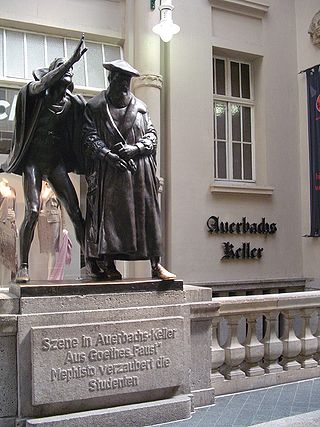
Faust is a tragic play in two parts by Johann Wolfgang von Goethe, usually known in English as Faust, Part One and Faust, Part Two. Nearly all of Part One and the majority of Part Two are written in rhymed verse. Although rarely staged in its entirety, it is the play with the largest audience numbers on German-language stages. Faust is considered by many to be Goethe's magnum opus and the greatest work of German literature.

Georg Faustus (sometimes also Georg Sebellicus Faustus , known in English as John Faustus, was a German itinerant alchemist, astrologer, and magician of the German Renaissance. He was often called a conman and a heretic by the people of medieval Europe.

Doctor Faustus is a German novel written by Thomas Mann, begun in 1943 and published in 1947 as Doktor Faustus: Das Leben des deutschen Tonsetzers Adrian Leverkühn, erzählt von einem Freunde.

A printer's devil was a young apprentice in a printing establishment who performed a number of tasks, such as mixing tubs of ink and fetching type. Notable writers including Benjamin Franklin, Walt Whitman, Ambrose Bierce, Bret Harte, and Mark Twain served as printer's devils in their youth along with indentured servants.

A deal with the Devil, also known as a Faustian bargain, is a cultural motif exemplified by the legend of Faust and the figure of Mephistopheles, as well as being elemental to many Christian traditions. According to traditional Christian belief about witchcraft, the pact is between a person and the Devil or another demon, trading a soul for diabolical favours, which vary by the tale, but tend to include youth, knowledge, wealth, fame and power.
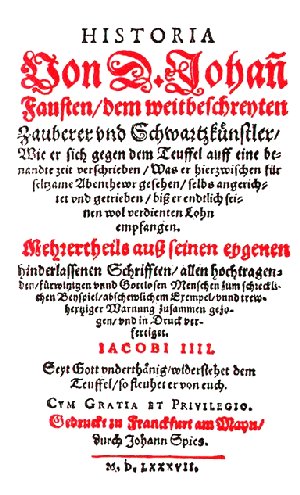
Historia von D. Johann Fausten, the first "Faust book", is a chapbook of stories concerning the life of Johann Georg Faust, written by an anonymous German author. It was published by Johann Spies (1540–1623) in Frankfurt am Main in 1587, and became the main source for the play The Tragical History of Doctor Faustus by Christopher Marlowe and Goethe's closet play Faust, and also served as the libretto of the opera by Alfred Schnittke, also entitled Historia von D. Johann Fausten.
Historia von D. Johann Fausten is an opera by the Russian composer Alfred Schnittke (1934–1998) in three acts, with introduction and epilogue to the German libretto by Jörg Morgener and Alfred Schnittke after the anonymous prose book of the same name.

Doctor Faustus is a supervillain appearing in American comic books published by Marvel Comics. The character is depicted usually as an adversary of Captain America. An Austrian psychiatrist and criminal mastermind who employs psychological manipulation on his enemies, the character was created by writer Stan Lee and artist Jack Kirby, and first appeared in Captain America #107.
Faust has inspired artistic and cultural works for over four centuries. The following lists cover various media to include items of historic interest, enduring works of high art, and recent representations in popular culture. The entries represent works that a reader has a reasonable chance of encountering rather than a complete catalog.
Leo Ruickbie is a British historian and sociologist of religion, specializing in exceptional experiences, paranormal beliefs, magic, witchcraft and Wicca. He is the author of several books, beginning with Witchcraft Out of the Shadows, a 2004 publication outlining the history of witchcraft from ancient Greece until the modern day. Ruickbie was born in Scotland and took a master's degree in Sociology and Religion at the University of Lancaster. He then studied at King's College London and was an awarded a PhD for his thesis entitled The Re-Enchanters: Theorising Re-Enchantment and Testing for its Presence in Modern Witchcraft. On Samhain 2007 he launched Open Source Wicca, a project inspired by the open-source software movement aimed at making the founding texts of Wicca more readily available by releasing them under a Creative Commons licence. In 2008 and 2009 he exhibited on the subject of witchcraft in France. He is also a council member of the Society for Psychical Research, a professional member of the Parapsychological Association, the European Society for the Study of Western Esotericism, and is on the committee of the Gesellschaft für Anomalistik. In 2021, he was elected a Fellow of the Royal Historical Society and in 2022 a Fellow of the Royal Anthropological Institute. He is the current editor of the Magazine of the Society for Psychical Research.

Renaissance magic was a resurgence in Hermeticism and Neoplatonic varieties of the magical arts which arose along with Renaissance humanism in the 15th and 16th centuries CE. During the Renaissance period, magic and occult practices underwent significant changes that reflected shifts in cultural, intellectual, and religious perspectives. C. S. Lewis, in his work on English literature, highlighted the transformation in how magic was perceived and portrayed. In medieval stories, magic had a fantastical and fairy-like quality, while in the Renaissance, it became more complex and tied to the idea of hidden knowledge that could be explored through books and rituals. This change is evident in the works of authors like Spenser, Marlowe, Chapman, and Shakespeare, who treated magic as a serious and potentially dangerous pursuit.

Johann Wolfgang von Goethe was a German polymath, who is widely regarded as the greatest and most influential writer in the German language. His work has had a profound and wide-ranging influence on Western literary, political, and philosophical thought from the late 18th century to the present day. A poet, playwright, novelist, scientist, statesman, theatre director, and critic, his works include plays, poetry and aesthetic criticism, as well as treatises on botany, anatomy, and color.
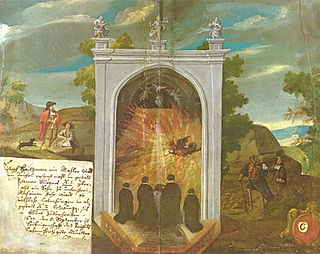
The idea of making a deal with the devil has appeared many times in works of popular culture. These pacts with the Devil can be found in many genres, including: books, music, comics, theater, movies, TV shows and games. When it comes to making a contract with the Devil, they all share the same prevailing desire, a mortal wants some worldly good for their own selfish gain, but in exchange, they must give up their soul for eternity.
